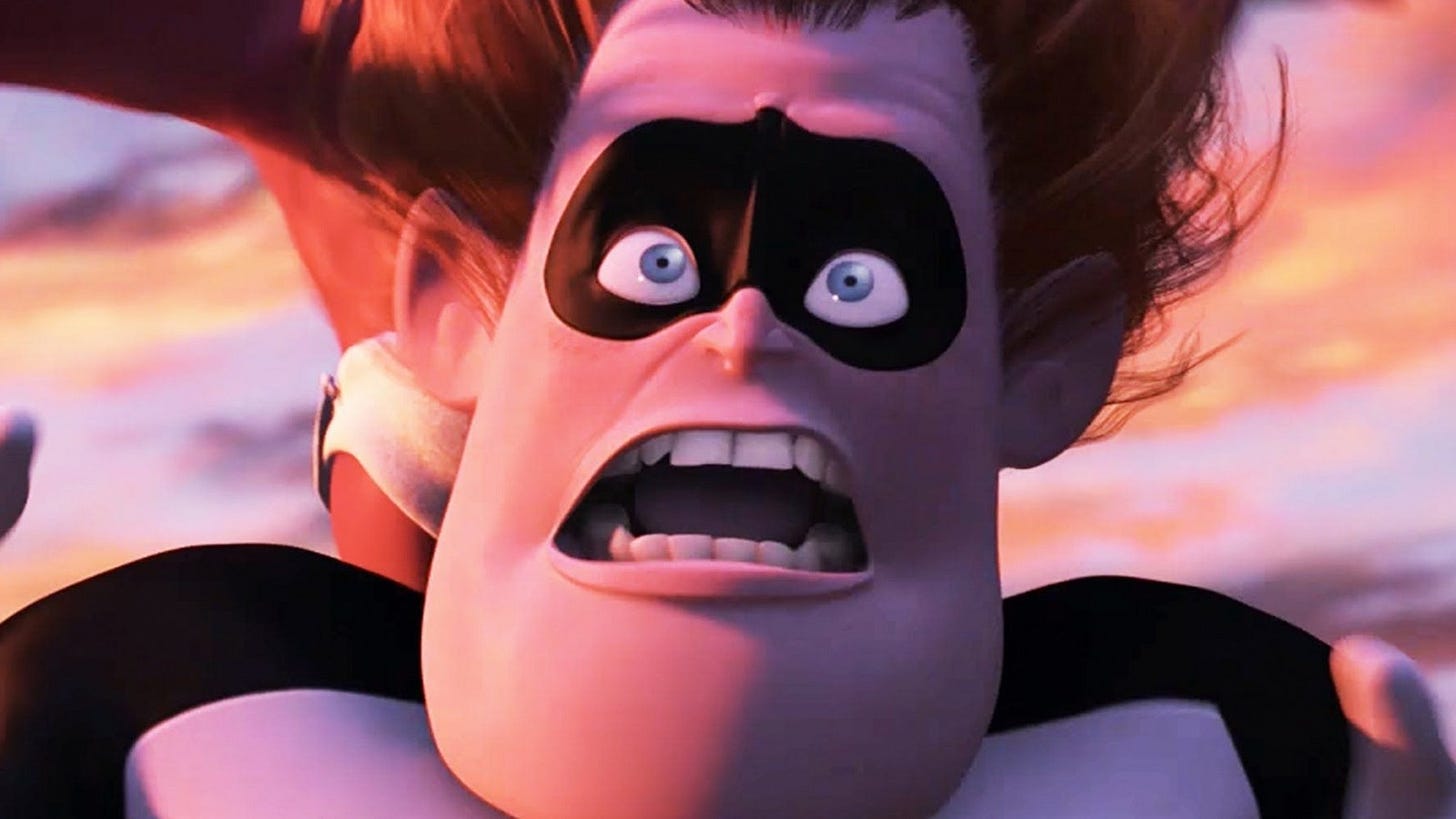What The Incredibles Teaches Us About "Identity" That Most People Miss
And why the 2004 movie is still relevant today.
The Incredibles is a 2004 animated Pixar movie that does so many things well that people miss the central theme. When it was released, it immediately became the best superhero film ever made.
The movie has already aged better than 2012’s The Avengers despite being eight years older. It was a breakthrough for a 3D animation studio that had struggled to animate humans, especially human hair. The voice cast is perfect. The callbacks to James Bond films are glorious. Brad Bird was the first outside director of a Pixar film, brought in partly based on the strength of The Iron Giant (another masterpiece.)
And its central theme is even more relevant today. What is that theme?
We are told at the very beginning.
Secret Identities
The movie opens with three heroes talking about secret identities. Who wants the pressure of being “super” all the time? Who would want to go shopping dressed like Elastigirl? “Superladies” think sharing a secret identity strengthens the relationship.
Mr. Incredible thinks about the simple life and raising a family. Elastigirl scoffs at the idea of settling down. A clash of identities is naturally wrapped up in the superhero life.
As the story goes on, we are invited to ask and debate the following questions:
Which identity is the real identity, and how is it determined?
Soon, disaster strikes. Mr. Incredible causes too much collateral damage and is sued again and again, and the government can't afford to keep paying. Heroes are outlawed. One official says: "It's time for their secret identity to be their only identity."
Mr. Incredible gets his wish to “settle down” good and hard.
But first, we are introduced to Buddy.
A Mismatch of Self-Identity and Reality
Buddy has created the identity of "Incrediboy." He is the sidekick of Mr. Incredible.
The problem, of course, is that Mr. Incredible disagrees with that identification. Buddy doesn't get to decide unilaterally what his identity is. It's not as simple as a mask you can put on and off.
Soon after, the heroes are found in a similar predicament. They thought they had a hero identity, but society now disagrees. Our heroes don't get to unilaterally decide to be superheroes. The relationship between superheroes and the people they save has been an unwritten but mutual agreement.
Identities are not atomistic things.
And so Mr. Incredible's identity becomes regular Bob Parr, who works in insurance. He hates it. But he feels stuck.
Bob knows he can do so much more. His son Dash knows he can do so much more and is acting out at school. His daughter Violet has no idea who she is and goes invisible to avoid other people.
Embracing or Refusing a New Identity
The only one adjusting fine is Helen Parr, the wife and mother. She has embraced her new identity despite the feminist undertone of her introduction. She is the housewife trying to keep it all together. She cooks. She cleans. She seems to have settled into her new life. Her secret identity has become her only identity, and she is comfortable in this new skin.
But Bob goes into full mid-life crisis mode, and suddenly, Helen's new identity is in jeopardy. She finds a stray hair. She starts to suspect. Even her new identity as a housewife is not 100% controlled by her. Without a loyal husband, she is no longer a settled, loyal wife.
Bob goes through his mid-life crisis because he has found someone who agrees with him that his identity should be that of a superhero. Mirage, the stunning, mysterious woman who appears out of nowhere, confirms Mr. Incredible’s self-image. Without that confirmation from someone else, Mr. Incredible is buried beneath the identity of Bob Parr. Despite his super-strength, Mr. Incredible’s identity depends upon other people.
Which brings us back to Buddy, now called Syndrome.
And wow, does Syndrome still have identity issues.
An Identity is More Than a Mask Or a Costume
Syndrome is a supervillian, but wants to be seen as a superhero. But again, he is foiled, because you can't just decide your own identity unilaterally. He tries an elaborate deception to overcome this, but it fails. The real heroes have to step in.
The resolution of the theme happens when Bob Parr, Mr. Incredible, correctly orients his conflicting identities. He is a husband and a father first. After that, everything begins to fall into place, including his superhero identity.
Violet, his daughter, understands the true stakes more than anyone else. During the scene at the fire with her brother, she says, "Mom and Dad's lives could be in jeopardy. Or worse, their marriage." This statement is played for laughs, the dramatic pronouncement of an anxiety-ridden teenage girl is extraordianary circumstances.
But Bob and Helen's marriage is the bonding agent that keeps all of their core identities intact. Violet is correct to be worried.
Only as a family can they be superheroes. The acceptance of each other within those bonds and boundaries allows each one to flourish in their own way. As a result, by the end of the film, more and more people begin to agree with them.
We Don’t Get to Choose
We do not get to choose our own identity. Our identities come from our bonds with other people. From the moment we are born, we are enmeshed in a series of relationships.
You don't choose your father and mother. You don't choose your name. You don't choose your sex. You are not an autonomous, sovereign individual. You do not get to unilaterally decide what your identity is. You can't just walk onto the court claiming to be an NBA basketball player. You can't just decide to be someone's boyfriend or girlfriend.
You can’t just decide to be someone’s sidekick; no more than a man can decide to become a woman.
It is our relationships that give shape to our identities, that provide borders where we can run wild and free. Having unlimited, unfettered choice in your identity is the same thing as dissolving away into nothing.
This truth is something the trans movement understands.
Trans and The Power of Other People
Why do trans people insist on people using the “correct” pronouns? Why do they see deadnaming as an unforgivable sin? Because deep down, they know they cannot unilaterally decide who they are. They must have people agree with their choice.
First, they're like Buddy. Then, they become like Syndrome.
The trans movement will never be content to play a private game of dress up and let everyone else go about their business. All of society must conform to their choice because they know their identity only matters in the context of other people. Without external affirmation and assent, their fancies are shown to be pure fiction, and that is a truth they cannot abide.
So don’t be gaslit by their pleas. Tell the truth. You can do it in a way that’s a bit more sensitive than ejecting them from the car like Mr. Incredible did to Buddy, but you should hold your ground.
The Incredibles is a great testimony to the power of other people, especially our families, to shape our identities. It's a lesson we should take to heart.







Even the villains can’t stomach Incrediboy. “Votre tenue est completement ridicule!”
I find myself quoting this movie every so often. It is certainly a classic family film and one of the few examples of a full, nuclear family that doesn't belittle any one member based on his or her traits. These characters all feel like real people struggling with real problems particular to their state in life and the gifts they've been given.
I recently heard a homily about how people often wear masks, and if they wear a particular mask for long enough, they'll grow into it. This idea is deeply integrated into this film, both literally and figuratively, and each character experiences some growth over the course of the film and it provides a good example for how we can learn to order our lives properly according to our state and vocation.